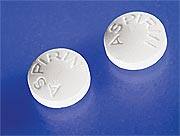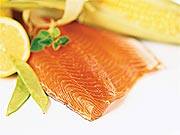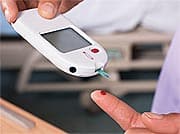Life Extension Magazine®
Fish Consumption Improves Survival in Prostate Cancer | |
Men who consume large amounts of fish have better survival from prostate cancer, according to a long-term follow-up study.* More than 20,000 men who participated in the Physician’s Health Study answered questionnaires at enrollment in 1983 about medical history, lifestyle characteristics, and food intake, and then reported all new illnesses each year thereafter. During follow-up of 19 years, 2,161 cases of prostate cancer occurred and 230 men died of the disease. Total fish intake was not a significant predictor of developing prostate cancer. However, consumption of fish and of fish-derived omega-3 fatty acids increased the likelihood of surviving prostate cancer. Men who ate fish at least five times per week (versus less than once per week) had a 48% lower risk of death from prostate cancer, and men with the highest fatty acid intake had a 35% lower risk. The results suggest that fish consumption delays prostate cancer progression. —Laura J. Ninger, ELS | |
| Reference | |
| * Chavarro JE, Stampfer MJ, Hall MN, Sesso HD, Ma J. A 22-y prospective study of fish intake in relation to prostate cancer incidence and mortality. Am J Clin Nutr. 2008 Nov;88(5):1297-303. | |
Flavonoids Help Maintain Body Weight in Women | |
High intake of flavones, flavonols, and catechins help maintain body weight in women.* These flavonoids are phytochemicals found in plant-derived foods such as fruits, vegetables, whole grains, wine, tea, herbs, and spices. The findings were derived from 4,280 men and women in the Netherlands who were questioned about food intake and lifestyle factors and then monitored for body mass index (BMI) over time. After 14 years of follow-up, BMI increased in both women and men. However, the increase in BMI was significantly smaller among the women with the highest intake of flavones, flavonols, and catechins (compared with the lowest intake). No effect of the phytochemicals was found in men. The favorable effects of flavonoids on weight control in women, say the authors, “may have important public health implications because even moderate elevations in BMI and body weight over a long period of time have been shown to increase disease risk.” —Laura J. Ninger, ELS | |
| Reference | |
| * Hughes LA, Arts IC, Ambergen T, et al; Netherlands Cohort Study. Higher dietary flavone, flavonol, and catechin intakes are associated with less of an increase in BMI over time in women: a longitudinal analysis from the Netherlands Cohort Study. Am J Clin Nutr. 2008 Nov;88(5):1341-52. | |
Decreased Antioxidant Levels Associated With Silent Atherosclerosis | |
| An article recently published in the journal Annals of Nutrition & Metabolism reports the discovery of an association between decreased plasma levels of several antioxidants and early carotid atherosclerotic lesions in asymptomatic middle-aged individuals.* In this study, 220 men and women without a history of transient ischemic attack, stroke, or other conditions related to carotid artery disease were enrolled at the San Camillo de Lellis Hospital, in Manfredonia, Italy. Vitamin A, vitamin E, and lycopene were decreased by 50% or more among the 125 subjects with atherosclerosis compared with participants who were not diagnosed with the condition, and beta-carotene levels were less than one-third of those without atherosclerosis. “Regular intake of foods rich in lycopene and other antioxidant vitamins may slow the progression of atherosclerotic processes and modify the early stages of atherosclerosis, with a consequent reduction in cardiovascular events,” the authors conclude. —Dayna Dye | |
| Reference | |
| * Riccioni G, Bucciarelli T, D’Orazio N, et al. Plasma antioxidants and asymptomatic carotid atherosclerotic disease. Ann Nutr Metab. 2008;53(2):86-90. | |
Greater Calcium Intake Correlated With Lower Body Mass Index | |
A recent issue of the journal Nutrition published the findings of Brazilian researchers of an association between greater calcium intake and lower body mass index in men and women.* Researchers at the Univ-ersity of Sao Paulo evaluated data from 1,459 participants in the Health Survey of the State of Sao Paulo. Calcium intake was calculated from the responses to participant questionnaires. A higher incidence of overweight and obesity was found among those whose calcium intake levels were in the lowest half of participants. For those whose intake was less than 398.5 mg per day, the risk of being overweight was 24% higher than the risk experienced by those whose intake was in the top 25% at 593.7 mg or more. “Further clinical research on the effects of calcium on fat metabolism must be pursued with randomized clinical trials,” the authors recommend. —Dayna Dye | |
| Reference | |
| * Bueno MB, Cesar CLG, Martini LA, Fisberg RM. Dietary calcium intake and overweight: An epidemiologic view. Nutrition. 2008 Nov;24(11-12):1110-5. | |
Chromium Plus Vitamins C & E Decrease Insulin Resistance in Diabetes | |
| The nutrient chromium, alone or in combination with vitamins C and E, significantly lessens oxidative stress and reduces insulin resistance among patients with type 2 diabetes, according to the results of a new controlled study.* Thirty subjects were blindly and randomly assigned to receive one of three regimens: chromium (1,000 mcg); chromium plus vitamin C (1,000 mg) and vitamin E (800 IU); or inactive placebo; each day for six months. At baseline, the subjects’ blood chromium levels and antioxidant status were measured. No significant differences were detected among the groups. But after half a year of supplementation, subjects taking chromium alone or chromium in combination with vitamin C and E experienced significantly improved antioxidant status and significantly reduced insulin resistance, fasting glucose, and hemoglobin A1c levels than subjects taking placebo. “These findings suggest that chromium supplementation alone and [the combination] of chromium together with vitamins C and E was effective for minimization of oxidative stress and improvement of glucose metabolism in type 2 [diabetes] patients,” concluded the study’s author. —Dale Kiefer | |
| Reference | |
| * Lai MH. Antioxidant effects and insulin resistance improvement of chromium combined with vitamin C and E supplementation for type 2 diabetes mellitus. J Clin Biochem Nutr. 2008 Nov;43(3):191-8. | |
Vitamin C Lowers C-Reactive Protein | |
A recent article in the journal Free Radical Biology and Medicine reports the finding of researchers at the University of California, Berkeley that supplementing with vitamin C reduces C-reactive protein (CRP),* a marker of inflammation linked with an increased risk of cardiovascular disease. Gladys Block, PhD, and her associates randomized 396 non-smokers to receive vitamin C, vitamin E, or a placebo for two months. Although no effect for vitamin C was noted among those with desirable CRP levels, for participants with elevated CRP, vitamin C lowered CRP by 0.25 mg/L compared with placebo, a reduction similar to that associated with statin drug treatment. “For people who have elevated CRP but not elevated LDL cholesterol, our data suggest that vitamin C should be investigated as an alternative to statins, or as something to be used to delay the time when statin use becomes necessary,” Dr. Block concluded. —Dayna Dye | |
| Reference | |
| * Block G, Jensen CD, Dalvi TB, et al. Vitamin C treatment reduces elevated C-reactive protein. Free Rad Biol Med. 2008 Oct 10. | |
Vitamin D Deficiency: An Emerging Cardiovascular Disease Risk Factor | |
A recent review published in the Journal of the American College of Cardiology describes the involvement of deficient vitamin D levels in common risk factors for cardiovascular disease and cardiovascular events.* Michael F. Holick, MD, PhD, and colleagues note that insufficient levels of vitamin D activate the renin-angiotensin-aldosterone system, which can lead to hypertension and thickening of the heart and blood vessel walls. Higher vitamin D levels have been associated with a lower risk of cardiovascular risk factors such as diabetes, hypertension, high triglycerides, and obesity. And among Framingham Heart Study participants who had reduced levels of vitamin D upon enrollment, the risk of subsequent cardiovascular events was twice as great as the risk experienced by those with higher levels of the vitamin. “Vitamin D deficiency is an unrecognized, emerging cardiovascular risk factor, which should be screened for and treated,” stated study co-author Dr. James H. O’Keefe. —Dayna Dye | |
| Reference | |
| * Lee JH, O’Keefe JH, Bell D, Hensrud DD, Holick MF. Vitamin D deficiency. An important, common, and easily treatable cardiovascular risk factor? J Am Coll Cardiol. 2008 Dec 9;52:1949-56. | |
Vitamin B1 Helps Reverse Early Kidney Disease in Diabetics | |
A report published in a recent issue of the journal Diabetologia reveals that high doses of the B vitamin thiamine can reverse one of the signs of early kidney disease in diabetic patients.* Diabetes increases the risk of kidney disease, which is detected in its early stage by testing for albumin in the urine. Naila Rabbani, PhD, of Warwick Medical School, in collaboration with researchers at the University of Punjab, randomized 40 type 2 diabetics with microalbuminuria to receive three 100 mg capsules of thiamine per day or a placebo for three months. By the end of the treatment period, the researchers observed a 41% average decrease in albumin excretion among patients who received vitamin B1.Thirty-five percent of participants experienced a return to normal albumin excretion with thiamine treatment. “This study once again highlights the importance of vitamin B1 and we need to increase awareness,” Dr. Rabbani stated. —Dayna Dye | |
| Reference | |
| * Rabbani N, Alam, SS, Riaz S, et al. High-dose thiamine therapy for patients with type 2 diabetes and microalbuminuria: a randomised, double-blind placebo-controlled pilot study. Diabetologia. 2008 Dec 5. | |
Cancer Prevention Research Conference Reports Protective Effect of Cruciferous Vegetables | |
| At the Seventh Annual International Conference on Frontiers in Cancer Prevention Research, Li Tang, PhD, reported the results of a study that compared the diets of lung cancer patients matched for smoking status with subjects who did not have cancer.* A strong association was found between a lower risk of lung cancer and greater consumption of fruit, total vegetables, and cruciferous vegetables. While the intake of fruit and total vegetables had a stronger protective effect among those who had never smoked, the benefit for cruciferous vegetables was found to exist only in smokers. Depending on the type of vegetable consumed, as well as smoking status and duration, smokers experienced a 20-55% reduction in lung cancer risk. “These findings, along with others, indicate cruciferous vegetables may play a more important role in cancer prevention among people exposed to cigarette-smoking,” Dr. Tang stated. —Dayna Dye | |
| Reference | |
| * Available at: http://www.medscape.com/viewarticle/583910. Accessed December 3, 2008. |









